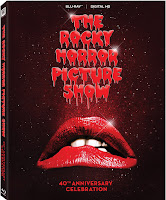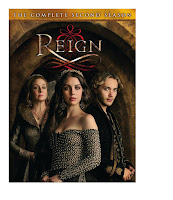3 Films by Benoit Jacquot
(Cohen Film Collection)
Mediocre French director Benoit Jacquot specializes in surface studies of young women that are energized by his actresses—notably Virginie Ledoyen, who became a star in 1995's A Single Girl, in which she persuasively portrays the title character juggling a boyfriend, pregnancy and dead-end job. Ledoyen highlights this three-film set, which also includes 1990's The Disenchanted, a blah look at a confused teenager starring Judith Goreche, and 1999's Keep It Quiet, a wan, sub-Chabrol satire that features Isabelle Huppert and Vahina Giaconte. The films themselves are noticeably improved in hi-def; extras are audio commentaries and new Jacquot interviews, but it’s too bad there's nothing about any of his leading ladies.
(Anchor Bay)
Revenge is always a go-to trope for a horror movie, and when a woman bashes men who've done her and others wrong, so much the better: at least that's what this blunt, bloody sequel to the sequel to the latest reboot promises. For awhile, it's a trashy guilty pleasure as rape victim Jennifer (a lively Sarah Butler) gets vengeance after her friend is killed by going after sleazebags who meet their applause-worthy demise; but it soon bogs down in ham-fisted visualizations of Jennifer’s crazed mindset. The hi-def transfer is first-rate.
Indian Summers
(PBS)
Indian Summers, a novelistic depiction of the misunderstandings among native Indians and their British rulers, takes its time fleshing out its characters’ political, personal and social status while fashioning a deepening and involving mystery; superb acting and unerring recreations of a bygone era give this 10-part series staying power. Based on a bizarre true story, The Widower absorbingly dramatizes how Malcolm Webster, after killing his first wife, tries to off his second and fools a third woman into falling for him: the performances of Reece Shearsmith (Malcolm), Sheridan Smith, Kate Fleetwood and Archie Panjabi (the women) and John Hannah (detective) are brilliantly of a piece, lending dramatic gravitas to this three-part mini-series. Both series have excellent hi-def transfers; lone Indian extra is a one-hour series documentary.
Roxy, The Movie—Frank Zappa & the Mothers
(Eagle Rock)
Shot live in Paris during his latest tour, Just Let Go shows Lenny Kravitz pumping out hit after hit for an adoring audience; although he took too commercial a turn after his first two well-crafted albums, there's no denying the joy in songs like "Let Love Rule," "It's Not Over Til It's Over" and "New York City." Roxy—The Movie, the Holy Grail for Frank Zappa fanatics, is the long-awaited video release of the legendary 1973 Los Angeles concerts that found Zappa and his crack band The Mothers of Invention at their peak, kicking out classic jams and showcasing Zappa's inimitable humor and nimble guitar playing. Both films look and sound excellent on Blu; extras include bonus songs.
(Anchor Bay)
This eight-part mini-series—narrated by Ray Liotta and featuring talking-head interviews with everyone from Rudy Giuliani to Chazz Palminteri, alongside many historians and experts—is a bastardization of the current mania for reenactment documentaries and docudramas. But the subject matter—how mobsters were able to rule New York City—is so compelling that it remains watchable throughout. The visuals are vividly evoked in hi-def; extras comprise deleted scenes and featurettes.
(Lionsgate)
As the drug-addicted title character, Edie Falco has proven her mettle as a gifted dramatic and comedic actress far beyond The Sopranos, in the process making this self-consciously cute but “serious” sitcom entertaining during its seven up-and-down seasons. The final season ends on an unsurprisingly ambiguous note, but even amid the many haphazard and wayward changes in tone, Falco is always on point. The hi-def transfer is solid; extras are commentaries, featurettes, deleted scenes and a gag reel.
(Fox)
Lightning doesn't strike twice when it comes to movie adaptations of John Green's popular young adult novels: whereas The Fault in Our Stars had a schmaltzy if tragic premise and the fantastically authentic actress Shailene Woodley, Jake Schreier's Towns has insufficient amounts of drama, comedy and even believable teenage behavior. I'm not asking for The Breakfast Club, mind you, but something more than the jokey silliness mitigating the nicely understated performances of Cara Delevingne and Nat Woolf as unlikely friends would be welcome. The movie has a sharp Blu-ray transfer; extras include deleted scenes, gag reel, making-of and featurettes.
(Magnolia)
Crystal Moselle's documentary about six home-schooled brothers who never ventured outside their lower Manhattan apartment and who began making home movies based on favorites they watched repeatedly begins rather one-dimensionally, as they’re seen primarily through their bizarre movie-only existence. Soon, however, Moselle effectively builds a sympathetic portrait of siblings using the only means possible to survive incarceration by their parents. The movie looks fine on Blu; extras include some of the brothers’ home movies.
The Great American Dream Machine
(S'more)
Shown on PBS from 1971-3, this satirical comedy-variety series, hosted and starring humorist Marshall Efron, was a forerunner of Saturday Night Live, but its three seasons were marked by the same sort of unevenness plaguing the shows that followed, as classic bits like Albert Brooks' hilarious "School for Comedians" are interspersed with pieces that don’t work or take too long to hit their marks. The wide-ranging nature of the show—short documentary interludes included a “Great American Hero” segment—allowed it to feature such notables as Studs Terkel, Evel Knievel and Andy Rooney, and the four discs have some true gems amid the dross. Extras include additional sketches.
(Accentus Music)
French composer Erik Satie was a master of musical miniatures, mostly piano works with the perfect balance of exquisite musicality and offbeat humor that no one else could approach without seeming hopelessly retrograde. This impressive hour-long exploration of his life and art finds the wondrous whimsy in the absurd that was Satie’s most endearing (and enduring) feature. The program includes interviews with experts and friends such as Jean Cocteau, as well as performances of some of his most representative works. Extras include more performances.
Anne Akiko Meyers—Serenade
(e one)
Leonard Bernstein’s five-movement Serenade, based on Greek philosophers' writings about love, is a concerto in all but name: and when Anne Akiko Meyers plays the solo violin part with such passionate intensity, it certainly sounds like the most romantic (in both senses) of Bernstein’s works. The rest of the CD comprises shorter pieces arranged for violin and orchestra (Keith Lockhart leads the London Symphony); the picks of this litter—Astor Piazzolla’s Oblivion and two Gershwin compositions—sound ethereally beautiful in Meyers' radiant hands (and bow).
(UME)
On his fourth solo studio album, Chris Cornell again teams with producer Brendan O'Brien for a sometimes dazzling trip through many of the singer's influences, from intimate folk to muscular rock to the Beatles; his trademark yelp is held in check as he shows off his vocal range on an eclectic group of songs adorned with sparse but inventive instrumentation by (mainly) Cornell and O'Brien. Highlights include the soaring chorus of "Before We Disappear," the majesty of the piano-based title track, the soothing optimism of "Our Time in the Universe" and the acoustic strumming on "Only These Words," which wouldn't be out of place on the American version of Rubber Soul.
(Le Chant du Monde)
Viktoria Mullova—Prokofiev
(Onyx)
For those for whom classical music might seem too imposing, Sergei Prokofiev’s bright and friendly Peter and the Wolf provides an intro to orchestral sounds and instrumentation: for those for whom even that might be too much, a clever big-band arrangement is played with cheerful aplomb by the French jazz combo The Amazing Keystone Big Band, with actor David Tenant as the capable narrator. On her new Prokofiev CD, the exciting Russian violinist Viktoria Mullova tackles three of the master's violin works—the spry and lively Second Concerto, the melancholy Sonata for Two Violins (with Tedi Papavrami) and the rueful Solo Violin Sonata—in a rich, purposeful recital.


















































